Developing Personal and Management Skills: A Self-Analysis Report
VerifiedAdded on 2020/03/16
|15
|2796
|48
Report
AI Summary
This report provides a self-analysis of personal and management skills development, focusing on the author's experience over twelve months. The report identifies areas for improvement, particularly in communication skills, and utilizes SWOT analysis and skill audits to assess strengths and weaknesses. It explores the impact of communication challenges in a team setting and the importance of both verbal and non-verbal communication. Furthermore, the report examines various learning styles, including Kolb's and VARK's models, to determine the most effective approach for personal skill enhancement. The author concludes that adopting Kolb's learning style will facilitate a systematic approach to improve interpersonal and presentation skills, emphasizing the importance of practical experience and self-reflection for professional growth.
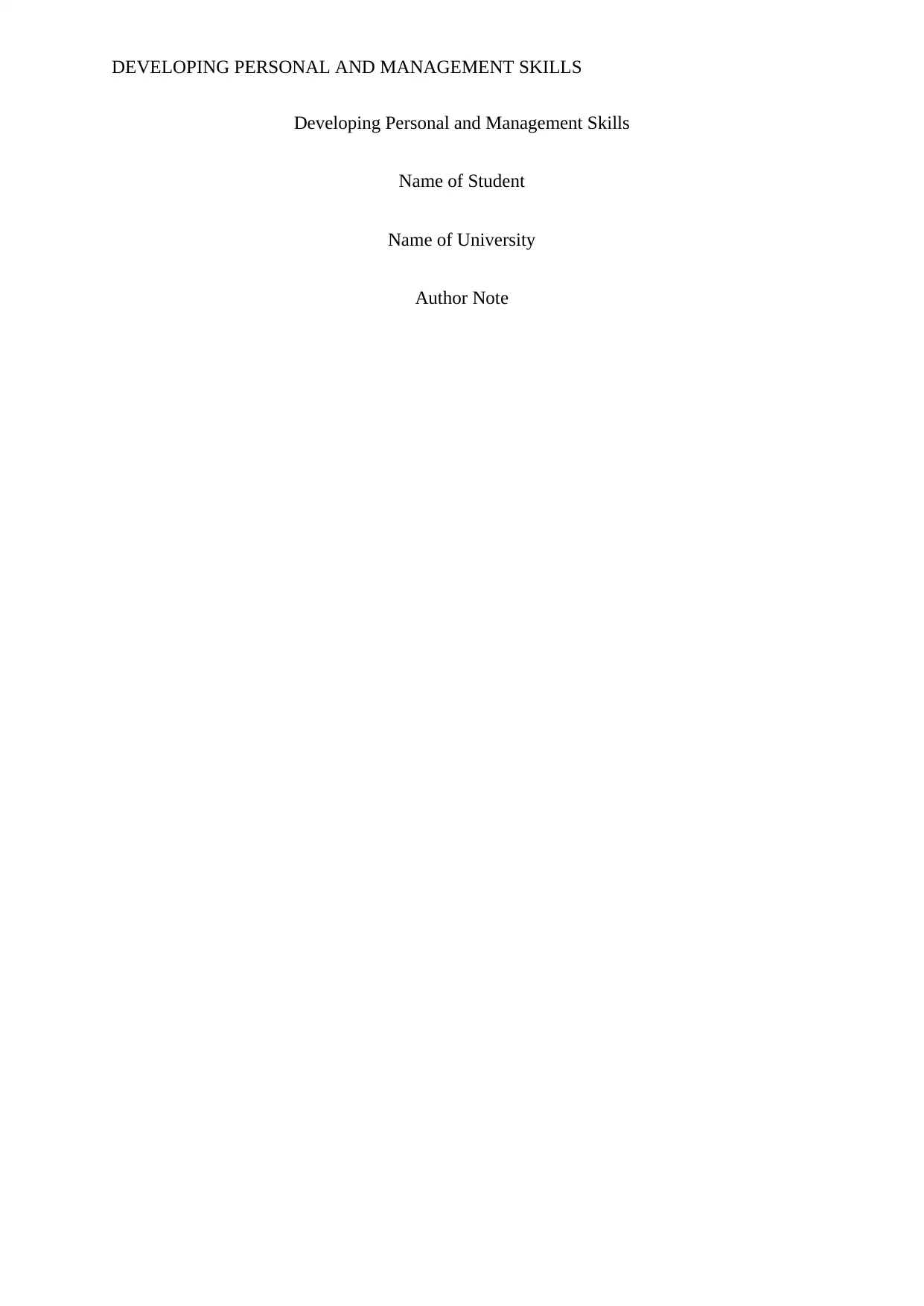
DEVELOPING PERSONAL AND MANAGEMENT SKILLS
Developing Personal and Management Skills
Name of Student
Name of University
Author Note
Developing Personal and Management Skills
Name of Student
Name of University
Author Note
Paraphrase This Document
Need a fresh take? Get an instant paraphrase of this document with our AI Paraphraser
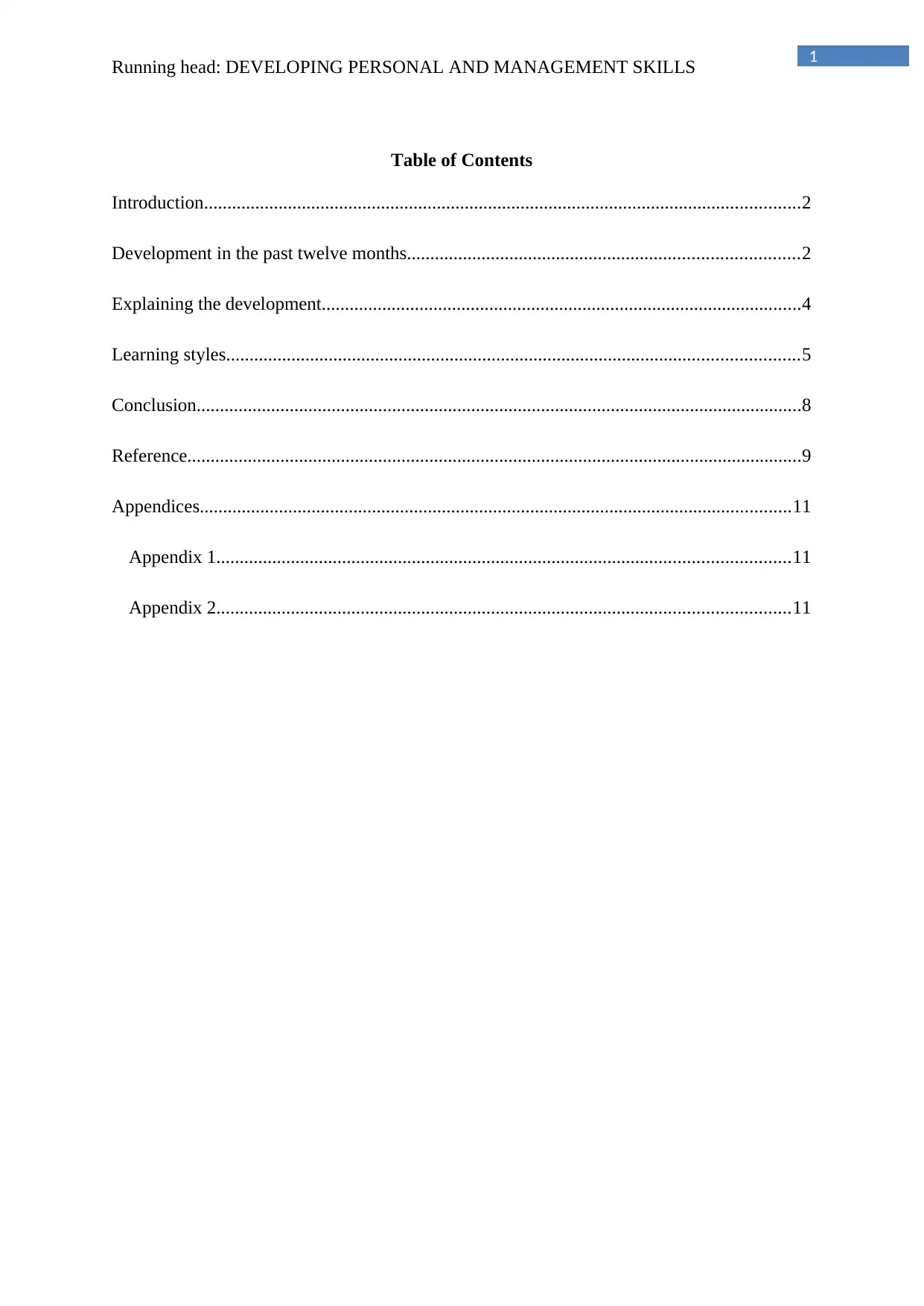
1
Running head: DEVELOPING PERSONAL AND MANAGEMENT SKILLS
Table of Contents
Introduction................................................................................................................................2
Development in the past twelve months....................................................................................2
Explaining the development.......................................................................................................4
Learning styles...........................................................................................................................5
Conclusion..................................................................................................................................8
Reference....................................................................................................................................9
Appendices...............................................................................................................................11
Appendix 1...........................................................................................................................11
Appendix 2...........................................................................................................................11
Running head: DEVELOPING PERSONAL AND MANAGEMENT SKILLS
Table of Contents
Introduction................................................................................................................................2
Development in the past twelve months....................................................................................2
Explaining the development.......................................................................................................4
Learning styles...........................................................................................................................5
Conclusion..................................................................................................................................8
Reference....................................................................................................................................9
Appendices...............................................................................................................................11
Appendix 1...........................................................................................................................11
Appendix 2...........................................................................................................................11
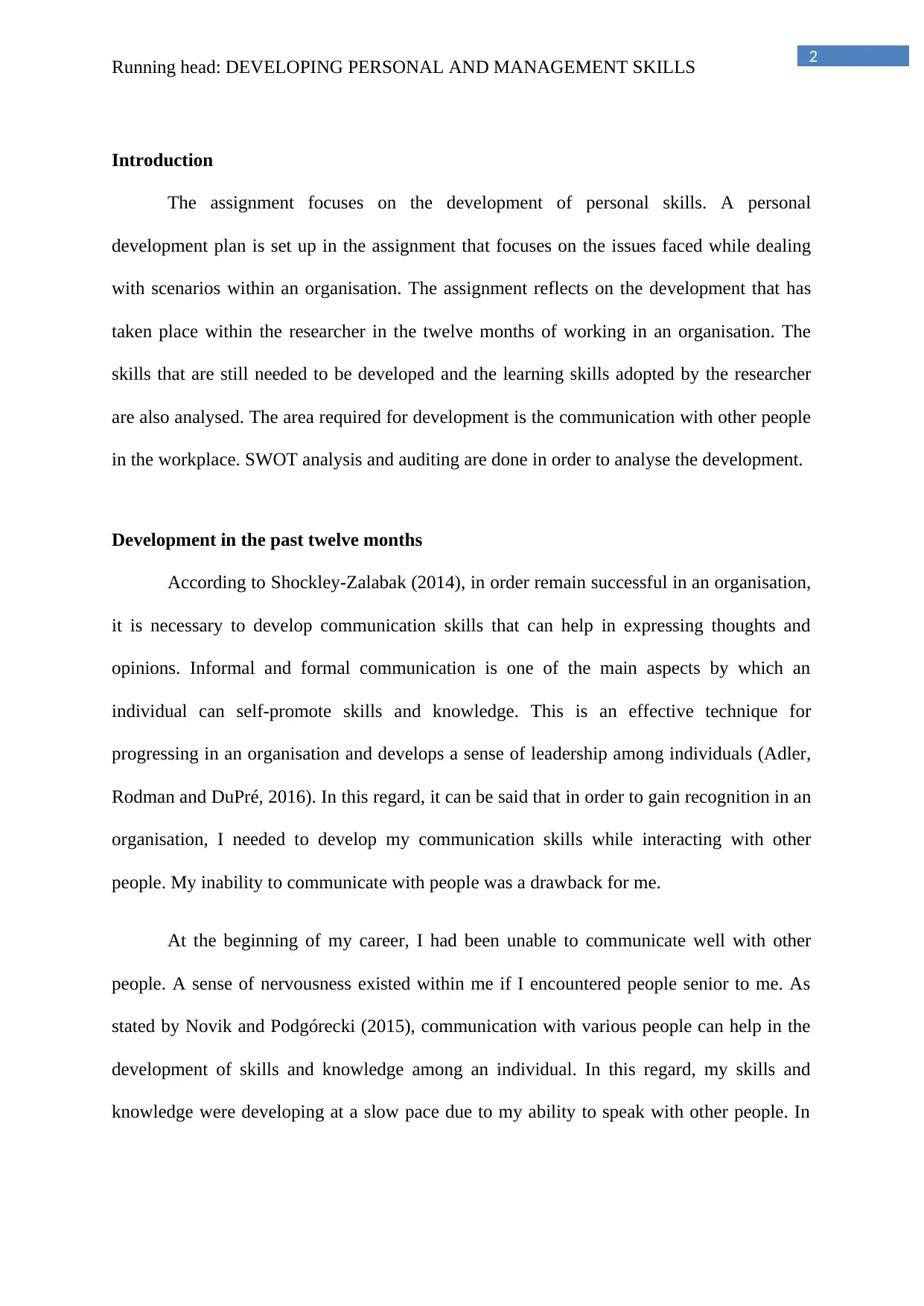
2
Running head: DEVELOPING PERSONAL AND MANAGEMENT SKILLS
Introduction
The assignment focuses on the development of personal skills. A personal
development plan is set up in the assignment that focuses on the issues faced while dealing
with scenarios within an organisation. The assignment reflects on the development that has
taken place within the researcher in the twelve months of working in an organisation. The
skills that are still needed to be developed and the learning skills adopted by the researcher
are also analysed. The area required for development is the communication with other people
in the workplace. SWOT analysis and auditing are done in order to analyse the development.
Development in the past twelve months
According to Shockley-Zalabak (2014), in order remain successful in an organisation,
it is necessary to develop communication skills that can help in expressing thoughts and
opinions. Informal and formal communication is one of the main aspects by which an
individual can self-promote skills and knowledge. This is an effective technique for
progressing in an organisation and develops a sense of leadership among individuals (Adler,
Rodman and DuPré, 2016). In this regard, it can be said that in order to gain recognition in an
organisation, I needed to develop my communication skills while interacting with other
people. My inability to communicate with people was a drawback for me.
At the beginning of my career, I had been unable to communicate well with other
people. A sense of nervousness existed within me if I encountered people senior to me. As
stated by Novik and Podgórecki (2015), communication with various people can help in the
development of skills and knowledge among an individual. In this regard, my skills and
knowledge were developing at a slow pace due to my ability to speak with other people. In
Running head: DEVELOPING PERSONAL AND MANAGEMENT SKILLS
Introduction
The assignment focuses on the development of personal skills. A personal
development plan is set up in the assignment that focuses on the issues faced while dealing
with scenarios within an organisation. The assignment reflects on the development that has
taken place within the researcher in the twelve months of working in an organisation. The
skills that are still needed to be developed and the learning skills adopted by the researcher
are also analysed. The area required for development is the communication with other people
in the workplace. SWOT analysis and auditing are done in order to analyse the development.
Development in the past twelve months
According to Shockley-Zalabak (2014), in order remain successful in an organisation,
it is necessary to develop communication skills that can help in expressing thoughts and
opinions. Informal and formal communication is one of the main aspects by which an
individual can self-promote skills and knowledge. This is an effective technique for
progressing in an organisation and develops a sense of leadership among individuals (Adler,
Rodman and DuPré, 2016). In this regard, it can be said that in order to gain recognition in an
organisation, I needed to develop my communication skills while interacting with other
people. My inability to communicate with people was a drawback for me.
At the beginning of my career, I had been unable to communicate well with other
people. A sense of nervousness existed within me if I encountered people senior to me. As
stated by Novik and Podgórecki (2015), communication with various people can help in the
development of skills and knowledge among an individual. In this regard, my skills and
knowledge were developing at a slow pace due to my ability to speak with other people. In
⊘ This is a preview!⊘
Do you want full access?
Subscribe today to unlock all pages.

Trusted by 1+ million students worldwide
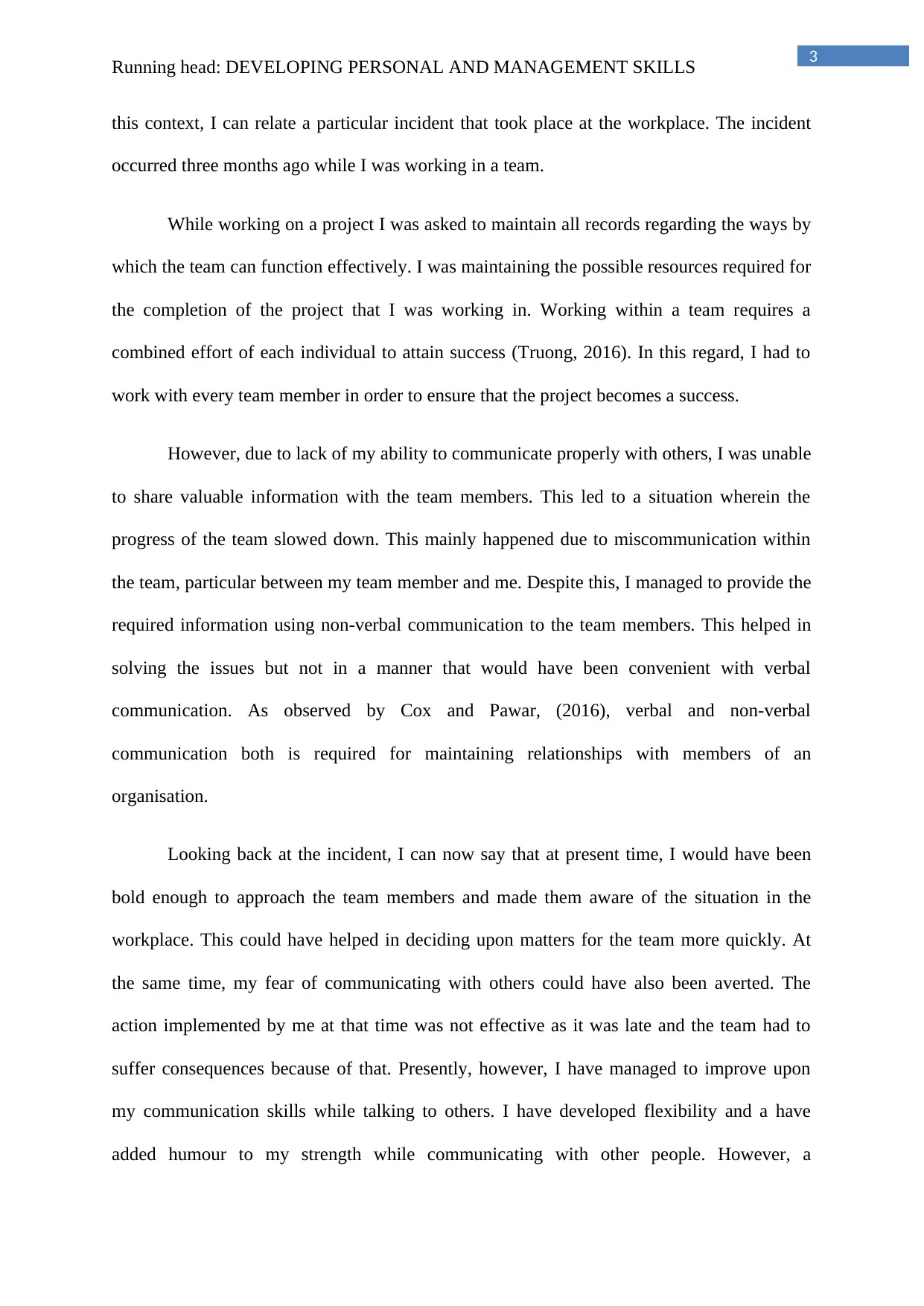
3
Running head: DEVELOPING PERSONAL AND MANAGEMENT SKILLS
this context, I can relate a particular incident that took place at the workplace. The incident
occurred three months ago while I was working in a team.
While working on a project I was asked to maintain all records regarding the ways by
which the team can function effectively. I was maintaining the possible resources required for
the completion of the project that I was working in. Working within a team requires a
combined effort of each individual to attain success (Truong, 2016). In this regard, I had to
work with every team member in order to ensure that the project becomes a success.
However, due to lack of my ability to communicate properly with others, I was unable
to share valuable information with the team members. This led to a situation wherein the
progress of the team slowed down. This mainly happened due to miscommunication within
the team, particular between my team member and me. Despite this, I managed to provide the
required information using non-verbal communication to the team members. This helped in
solving the issues but not in a manner that would have been convenient with verbal
communication. As observed by Cox and Pawar, (2016), verbal and non-verbal
communication both is required for maintaining relationships with members of an
organisation.
Looking back at the incident, I can now say that at present time, I would have been
bold enough to approach the team members and made them aware of the situation in the
workplace. This could have helped in deciding upon matters for the team more quickly. At
the same time, my fear of communicating with others could have also been averted. The
action implemented by me at that time was not effective as it was late and the team had to
suffer consequences because of that. Presently, however, I have managed to improve upon
my communication skills while talking to others. I have developed flexibility and a have
added humour to my strength while communicating with other people. However, a
Running head: DEVELOPING PERSONAL AND MANAGEMENT SKILLS
this context, I can relate a particular incident that took place at the workplace. The incident
occurred three months ago while I was working in a team.
While working on a project I was asked to maintain all records regarding the ways by
which the team can function effectively. I was maintaining the possible resources required for
the completion of the project that I was working in. Working within a team requires a
combined effort of each individual to attain success (Truong, 2016). In this regard, I had to
work with every team member in order to ensure that the project becomes a success.
However, due to lack of my ability to communicate properly with others, I was unable
to share valuable information with the team members. This led to a situation wherein the
progress of the team slowed down. This mainly happened due to miscommunication within
the team, particular between my team member and me. Despite this, I managed to provide the
required information using non-verbal communication to the team members. This helped in
solving the issues but not in a manner that would have been convenient with verbal
communication. As observed by Cox and Pawar, (2016), verbal and non-verbal
communication both is required for maintaining relationships with members of an
organisation.
Looking back at the incident, I can now say that at present time, I would have been
bold enough to approach the team members and made them aware of the situation in the
workplace. This could have helped in deciding upon matters for the team more quickly. At
the same time, my fear of communicating with others could have also been averted. The
action implemented by me at that time was not effective as it was late and the team had to
suffer consequences because of that. Presently, however, I have managed to improve upon
my communication skills while talking to others. I have developed flexibility and a have
added humour to my strength while communicating with other people. However, a
Paraphrase This Document
Need a fresh take? Get an instant paraphrase of this document with our AI Paraphraser
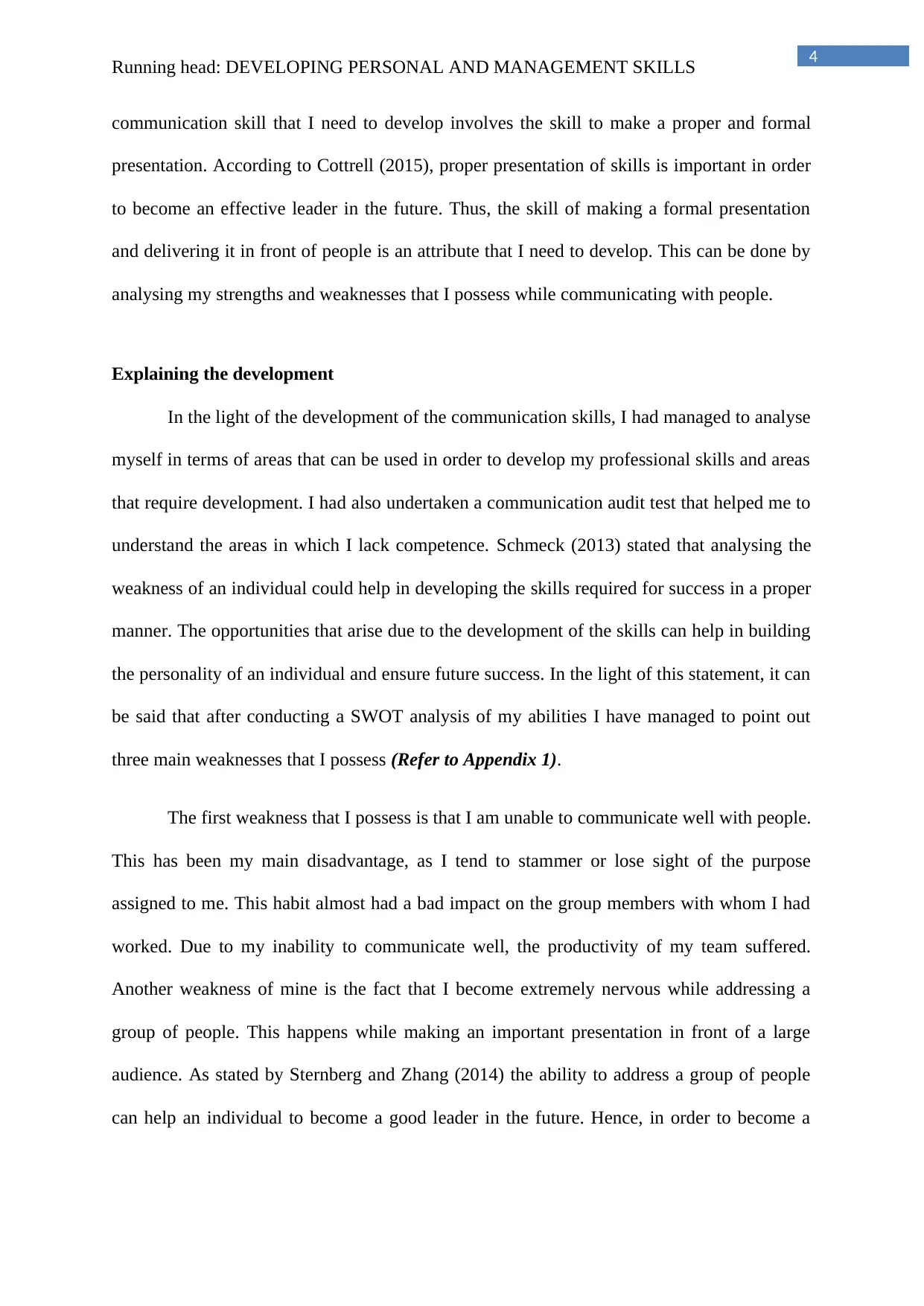
4
Running head: DEVELOPING PERSONAL AND MANAGEMENT SKILLS
communication skill that I need to develop involves the skill to make a proper and formal
presentation. According to Cottrell (2015), proper presentation of skills is important in order
to become an effective leader in the future. Thus, the skill of making a formal presentation
and delivering it in front of people is an attribute that I need to develop. This can be done by
analysing my strengths and weaknesses that I possess while communicating with people.
Explaining the development
In the light of the development of the communication skills, I had managed to analyse
myself in terms of areas that can be used in order to develop my professional skills and areas
that require development. I had also undertaken a communication audit test that helped me to
understand the areas in which I lack competence. Schmeck (2013) stated that analysing the
weakness of an individual could help in developing the skills required for success in a proper
manner. The opportunities that arise due to the development of the skills can help in building
the personality of an individual and ensure future success. In the light of this statement, it can
be said that after conducting a SWOT analysis of my abilities I have managed to point out
three main weaknesses that I possess (Refer to Appendix 1).
The first weakness that I possess is that I am unable to communicate well with people.
This has been my main disadvantage, as I tend to stammer or lose sight of the purpose
assigned to me. This habit almost had a bad impact on the group members with whom I had
worked. Due to my inability to communicate well, the productivity of my team suffered.
Another weakness of mine is the fact that I become extremely nervous while addressing a
group of people. This happens while making an important presentation in front of a large
audience. As stated by Sternberg and Zhang (2014) the ability to address a group of people
can help an individual to become a good leader in the future. Hence, in order to become a
Running head: DEVELOPING PERSONAL AND MANAGEMENT SKILLS
communication skill that I need to develop involves the skill to make a proper and formal
presentation. According to Cottrell (2015), proper presentation of skills is important in order
to become an effective leader in the future. Thus, the skill of making a formal presentation
and delivering it in front of people is an attribute that I need to develop. This can be done by
analysing my strengths and weaknesses that I possess while communicating with people.
Explaining the development
In the light of the development of the communication skills, I had managed to analyse
myself in terms of areas that can be used in order to develop my professional skills and areas
that require development. I had also undertaken a communication audit test that helped me to
understand the areas in which I lack competence. Schmeck (2013) stated that analysing the
weakness of an individual could help in developing the skills required for success in a proper
manner. The opportunities that arise due to the development of the skills can help in building
the personality of an individual and ensure future success. In the light of this statement, it can
be said that after conducting a SWOT analysis of my abilities I have managed to point out
three main weaknesses that I possess (Refer to Appendix 1).
The first weakness that I possess is that I am unable to communicate well with people.
This has been my main disadvantage, as I tend to stammer or lose sight of the purpose
assigned to me. This habit almost had a bad impact on the group members with whom I had
worked. Due to my inability to communicate well, the productivity of my team suffered.
Another weakness of mine is the fact that I become extremely nervous while addressing a
group of people. This happens while making an important presentation in front of a large
audience. As stated by Sternberg and Zhang (2014) the ability to address a group of people
can help an individual to become a good leader in the future. Hence, in order to become a
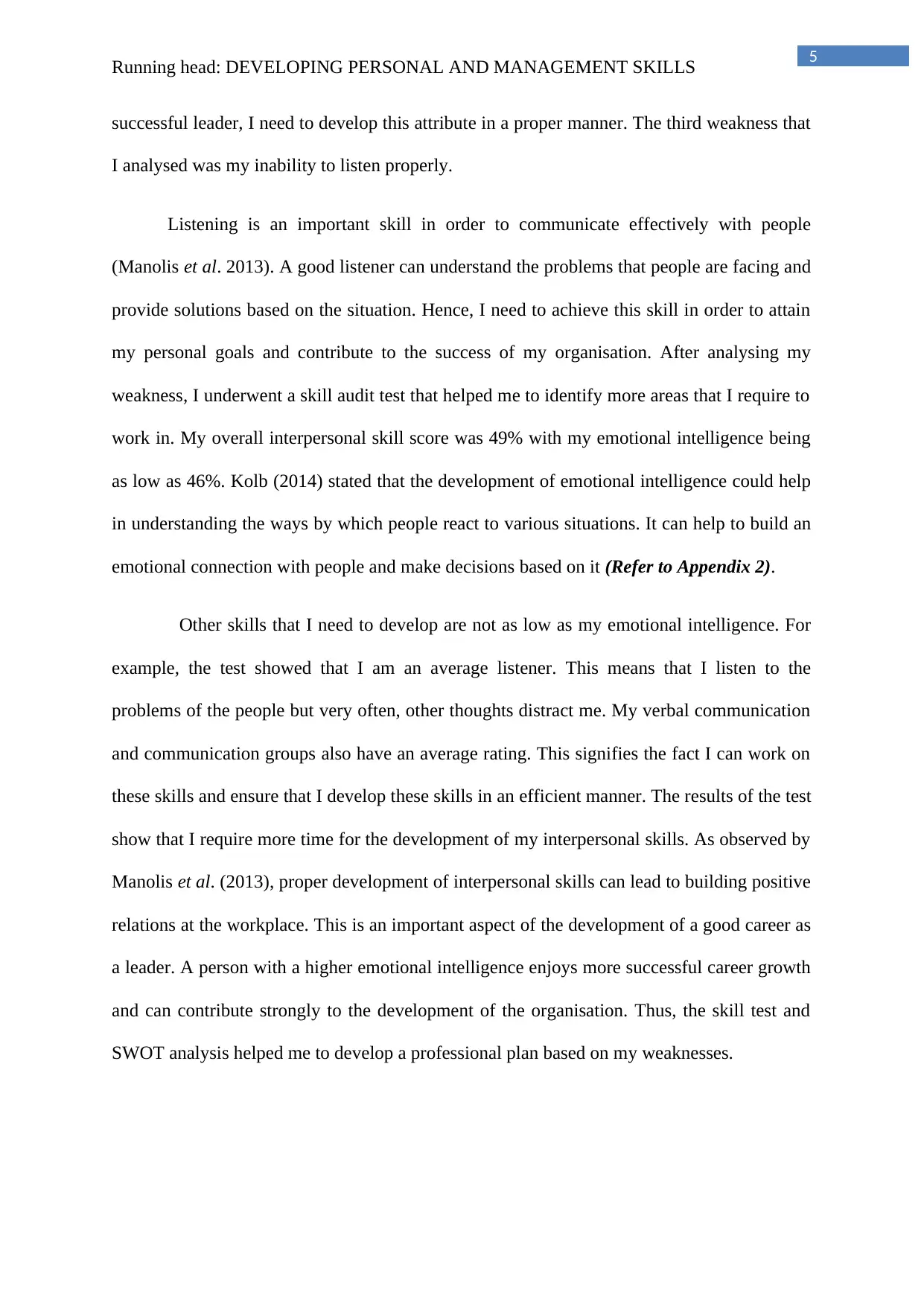
5
Running head: DEVELOPING PERSONAL AND MANAGEMENT SKILLS
successful leader, I need to develop this attribute in a proper manner. The third weakness that
I analysed was my inability to listen properly.
Listening is an important skill in order to communicate effectively with people
(Manolis et al. 2013). A good listener can understand the problems that people are facing and
provide solutions based on the situation. Hence, I need to achieve this skill in order to attain
my personal goals and contribute to the success of my organisation. After analysing my
weakness, I underwent a skill audit test that helped me to identify more areas that I require to
work in. My overall interpersonal skill score was 49% with my emotional intelligence being
as low as 46%. Kolb (2014) stated that the development of emotional intelligence could help
in understanding the ways by which people react to various situations. It can help to build an
emotional connection with people and make decisions based on it (Refer to Appendix 2).
Other skills that I need to develop are not as low as my emotional intelligence. For
example, the test showed that I am an average listener. This means that I listen to the
problems of the people but very often, other thoughts distract me. My verbal communication
and communication groups also have an average rating. This signifies the fact I can work on
these skills and ensure that I develop these skills in an efficient manner. The results of the test
show that I require more time for the development of my interpersonal skills. As observed by
Manolis et al. (2013), proper development of interpersonal skills can lead to building positive
relations at the workplace. This is an important aspect of the development of a good career as
a leader. A person with a higher emotional intelligence enjoys more successful career growth
and can contribute strongly to the development of the organisation. Thus, the skill test and
SWOT analysis helped me to develop a professional plan based on my weaknesses.
Running head: DEVELOPING PERSONAL AND MANAGEMENT SKILLS
successful leader, I need to develop this attribute in a proper manner. The third weakness that
I analysed was my inability to listen properly.
Listening is an important skill in order to communicate effectively with people
(Manolis et al. 2013). A good listener can understand the problems that people are facing and
provide solutions based on the situation. Hence, I need to achieve this skill in order to attain
my personal goals and contribute to the success of my organisation. After analysing my
weakness, I underwent a skill audit test that helped me to identify more areas that I require to
work in. My overall interpersonal skill score was 49% with my emotional intelligence being
as low as 46%. Kolb (2014) stated that the development of emotional intelligence could help
in understanding the ways by which people react to various situations. It can help to build an
emotional connection with people and make decisions based on it (Refer to Appendix 2).
Other skills that I need to develop are not as low as my emotional intelligence. For
example, the test showed that I am an average listener. This means that I listen to the
problems of the people but very often, other thoughts distract me. My verbal communication
and communication groups also have an average rating. This signifies the fact I can work on
these skills and ensure that I develop these skills in an efficient manner. The results of the test
show that I require more time for the development of my interpersonal skills. As observed by
Manolis et al. (2013), proper development of interpersonal skills can lead to building positive
relations at the workplace. This is an important aspect of the development of a good career as
a leader. A person with a higher emotional intelligence enjoys more successful career growth
and can contribute strongly to the development of the organisation. Thus, the skill test and
SWOT analysis helped me to develop a professional plan based on my weaknesses.
⊘ This is a preview!⊘
Do you want full access?
Subscribe today to unlock all pages.

Trusted by 1+ million students worldwide
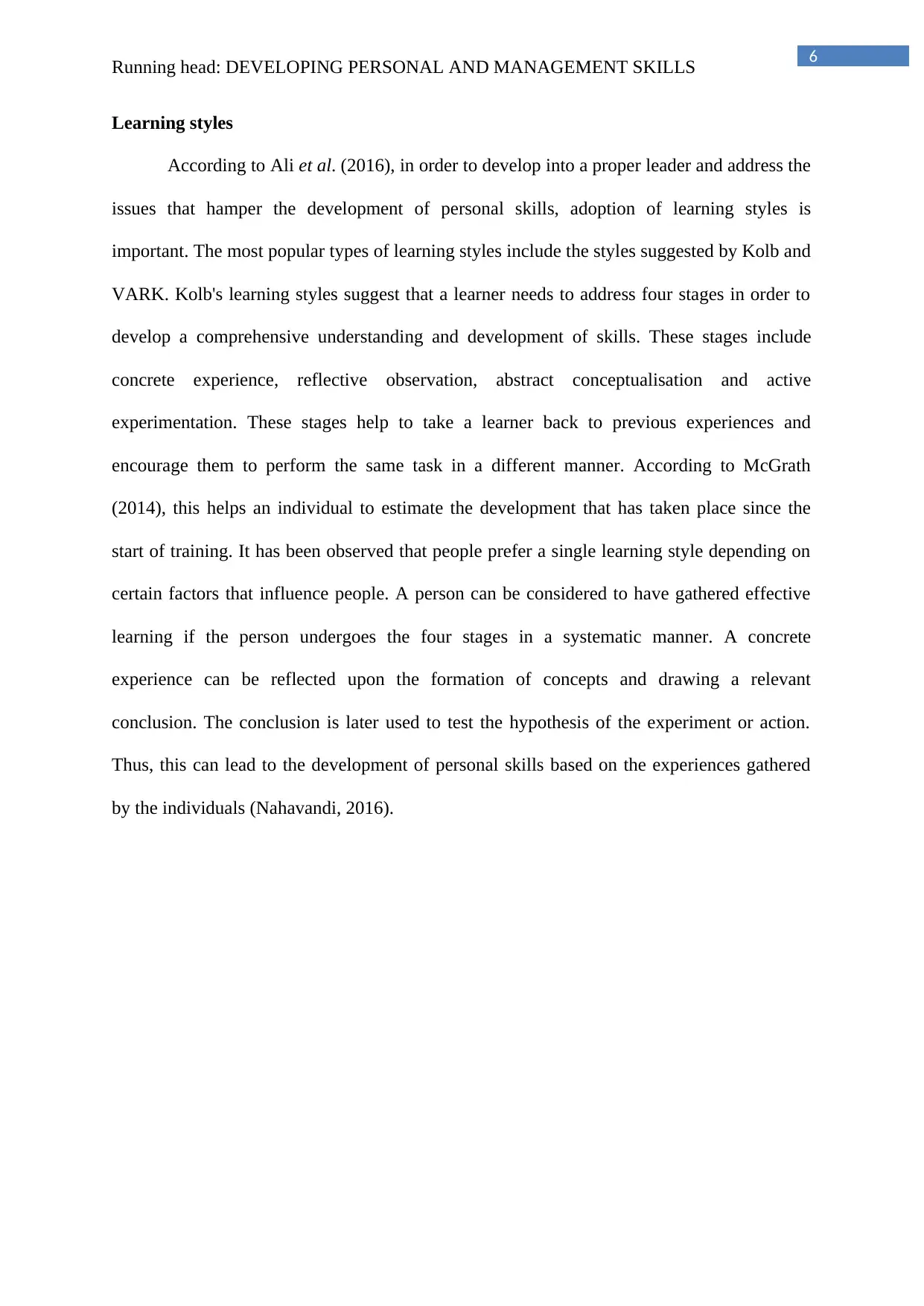
6
Running head: DEVELOPING PERSONAL AND MANAGEMENT SKILLS
Learning styles
According to Ali et al. (2016), in order to develop into a proper leader and address the
issues that hamper the development of personal skills, adoption of learning styles is
important. The most popular types of learning styles include the styles suggested by Kolb and
VARK. Kolb's learning styles suggest that a learner needs to address four stages in order to
develop a comprehensive understanding and development of skills. These stages include
concrete experience, reflective observation, abstract conceptualisation and active
experimentation. These stages help to take a learner back to previous experiences and
encourage them to perform the same task in a different manner. According to McGrath
(2014), this helps an individual to estimate the development that has taken place since the
start of training. It has been observed that people prefer a single learning style depending on
certain factors that influence people. A person can be considered to have gathered effective
learning if the person undergoes the four stages in a systematic manner. A concrete
experience can be reflected upon the formation of concepts and drawing a relevant
conclusion. The conclusion is later used to test the hypothesis of the experiment or action.
Thus, this can lead to the development of personal skills based on the experiences gathered
by the individuals (Nahavandi, 2016).
Running head: DEVELOPING PERSONAL AND MANAGEMENT SKILLS
Learning styles
According to Ali et al. (2016), in order to develop into a proper leader and address the
issues that hamper the development of personal skills, adoption of learning styles is
important. The most popular types of learning styles include the styles suggested by Kolb and
VARK. Kolb's learning styles suggest that a learner needs to address four stages in order to
develop a comprehensive understanding and development of skills. These stages include
concrete experience, reflective observation, abstract conceptualisation and active
experimentation. These stages help to take a learner back to previous experiences and
encourage them to perform the same task in a different manner. According to McGrath
(2014), this helps an individual to estimate the development that has taken place since the
start of training. It has been observed that people prefer a single learning style depending on
certain factors that influence people. A person can be considered to have gathered effective
learning if the person undergoes the four stages in a systematic manner. A concrete
experience can be reflected upon the formation of concepts and drawing a relevant
conclusion. The conclusion is later used to test the hypothesis of the experiment or action.
Thus, this can lead to the development of personal skills based on the experiences gathered
by the individuals (Nahavandi, 2016).
Paraphrase This Document
Need a fresh take? Get an instant paraphrase of this document with our AI Paraphraser
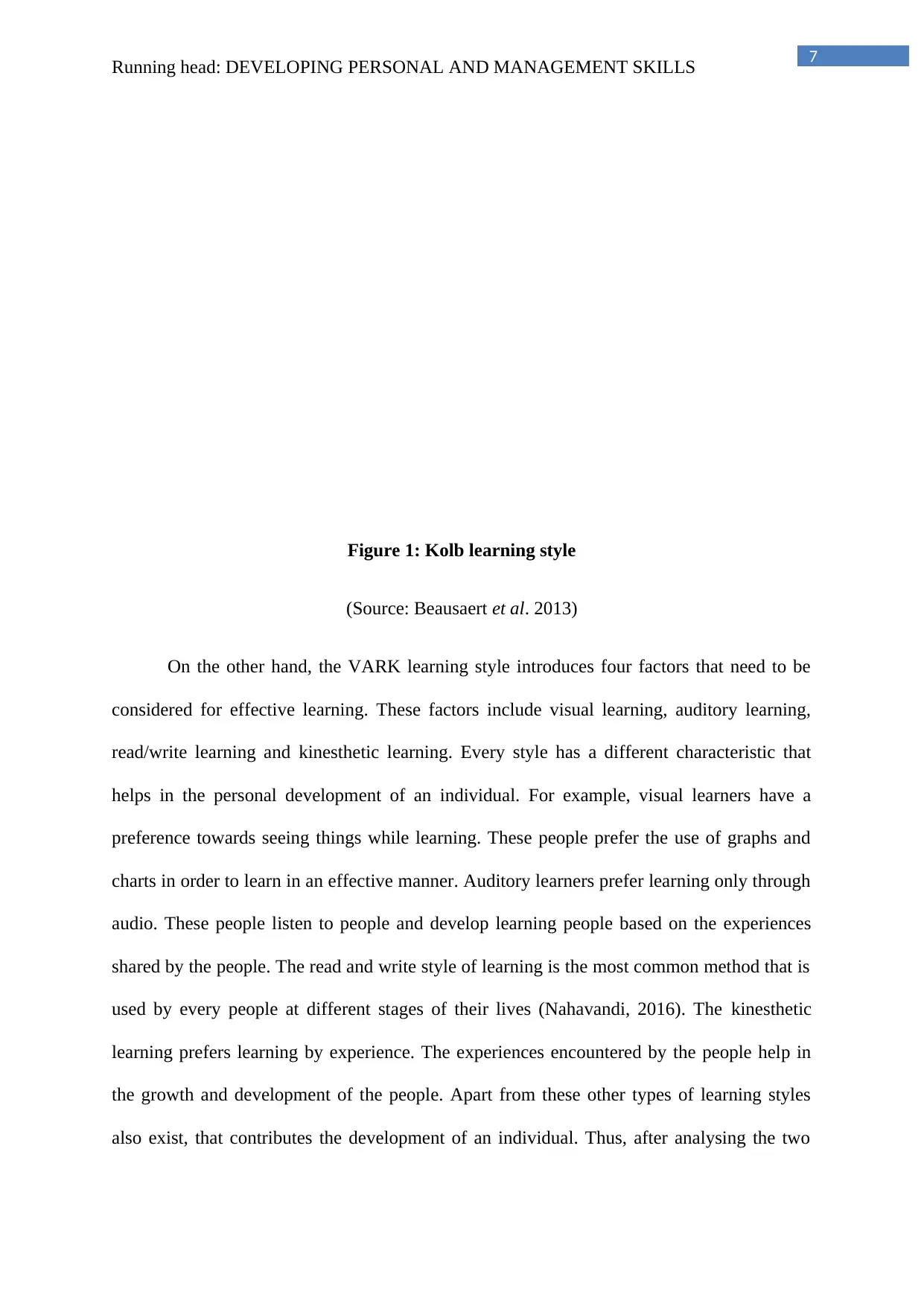
7
Running head: DEVELOPING PERSONAL AND MANAGEMENT SKILLS
Figure 1: Kolb learning style
(Source: Beausaert et al. 2013)
On the other hand, the VARK learning style introduces four factors that need to be
considered for effective learning. These factors include visual learning, auditory learning,
read/write learning and kinesthetic learning. Every style has a different characteristic that
helps in the personal development of an individual. For example, visual learners have a
preference towards seeing things while learning. These people prefer the use of graphs and
charts in order to learn in an effective manner. Auditory learners prefer learning only through
audio. These people listen to people and develop learning people based on the experiences
shared by the people. The read and write style of learning is the most common method that is
used by every people at different stages of their lives (Nahavandi, 2016). The kinesthetic
learning prefers learning by experience. The experiences encountered by the people help in
the growth and development of the people. Apart from these other types of learning styles
also exist, that contributes the development of an individual. Thus, after analysing the two
Running head: DEVELOPING PERSONAL AND MANAGEMENT SKILLS
Figure 1: Kolb learning style
(Source: Beausaert et al. 2013)
On the other hand, the VARK learning style introduces four factors that need to be
considered for effective learning. These factors include visual learning, auditory learning,
read/write learning and kinesthetic learning. Every style has a different characteristic that
helps in the personal development of an individual. For example, visual learners have a
preference towards seeing things while learning. These people prefer the use of graphs and
charts in order to learn in an effective manner. Auditory learners prefer learning only through
audio. These people listen to people and develop learning people based on the experiences
shared by the people. The read and write style of learning is the most common method that is
used by every people at different stages of their lives (Nahavandi, 2016). The kinesthetic
learning prefers learning by experience. The experiences encountered by the people help in
the growth and development of the people. Apart from these other types of learning styles
also exist, that contributes the development of an individual. Thus, after analysing the two
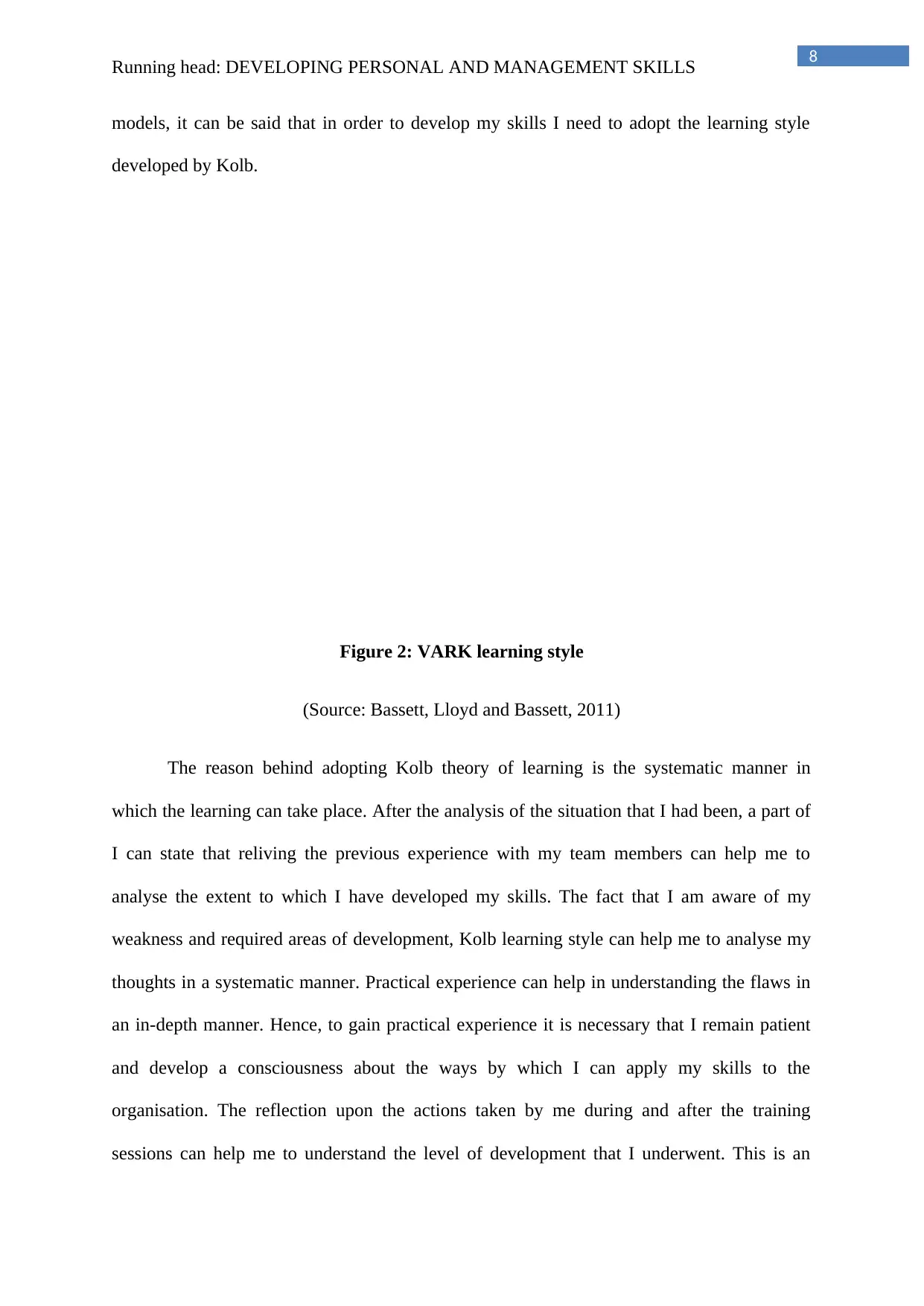
8
Running head: DEVELOPING PERSONAL AND MANAGEMENT SKILLS
models, it can be said that in order to develop my skills I need to adopt the learning style
developed by Kolb.
Figure 2: VARK learning style
(Source: Bassett, Lloyd and Bassett, 2011)
The reason behind adopting Kolb theory of learning is the systematic manner in
which the learning can take place. After the analysis of the situation that I had been, a part of
I can state that reliving the previous experience with my team members can help me to
analyse the extent to which I have developed my skills. The fact that I am aware of my
weakness and required areas of development, Kolb learning style can help me to analyse my
thoughts in a systematic manner. Practical experience can help in understanding the flaws in
an in-depth manner. Hence, to gain practical experience it is necessary that I remain patient
and develop a consciousness about the ways by which I can apply my skills to the
organisation. The reflection upon the actions taken by me during and after the training
sessions can help me to understand the level of development that I underwent. This is an
VisuallearningAuditorylearningRead/writelearningKinestheticlearning
Running head: DEVELOPING PERSONAL AND MANAGEMENT SKILLS
models, it can be said that in order to develop my skills I need to adopt the learning style
developed by Kolb.
Figure 2: VARK learning style
(Source: Bassett, Lloyd and Bassett, 2011)
The reason behind adopting Kolb theory of learning is the systematic manner in
which the learning can take place. After the analysis of the situation that I had been, a part of
I can state that reliving the previous experience with my team members can help me to
analyse the extent to which I have developed my skills. The fact that I am aware of my
weakness and required areas of development, Kolb learning style can help me to analyse my
thoughts in a systematic manner. Practical experience can help in understanding the flaws in
an in-depth manner. Hence, to gain practical experience it is necessary that I remain patient
and develop a consciousness about the ways by which I can apply my skills to the
organisation. The reflection upon the actions taken by me during and after the training
sessions can help me to understand the level of development that I underwent. This is an
VisuallearningAuditorylearningRead/writelearningKinestheticlearning
⊘ This is a preview!⊘
Do you want full access?
Subscribe today to unlock all pages.

Trusted by 1+ million students worldwide
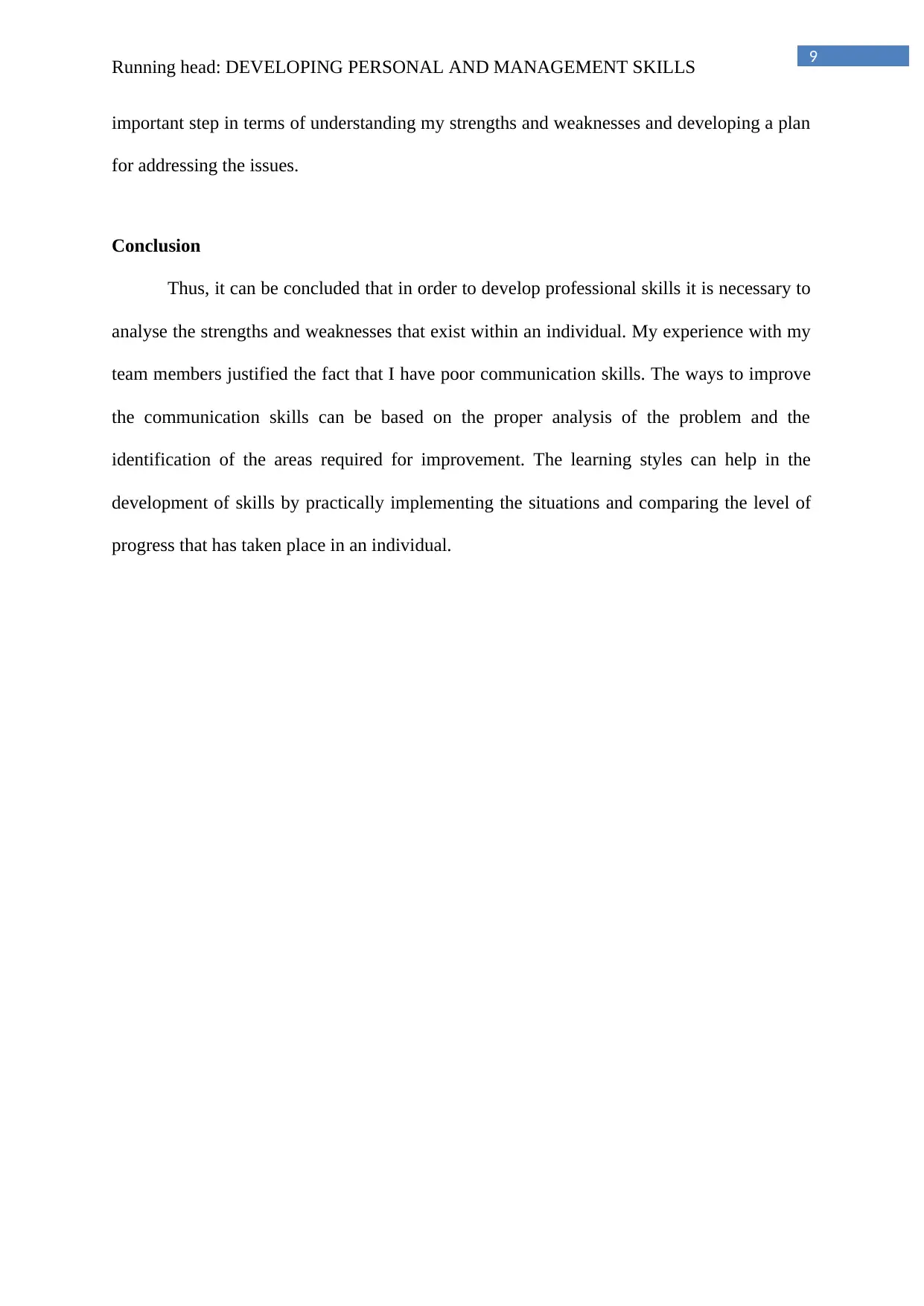
9
Running head: DEVELOPING PERSONAL AND MANAGEMENT SKILLS
important step in terms of understanding my strengths and weaknesses and developing a plan
for addressing the issues.
Conclusion
Thus, it can be concluded that in order to develop professional skills it is necessary to
analyse the strengths and weaknesses that exist within an individual. My experience with my
team members justified the fact that I have poor communication skills. The ways to improve
the communication skills can be based on the proper analysis of the problem and the
identification of the areas required for improvement. The learning styles can help in the
development of skills by practically implementing the situations and comparing the level of
progress that has taken place in an individual.
Running head: DEVELOPING PERSONAL AND MANAGEMENT SKILLS
important step in terms of understanding my strengths and weaknesses and developing a plan
for addressing the issues.
Conclusion
Thus, it can be concluded that in order to develop professional skills it is necessary to
analyse the strengths and weaknesses that exist within an individual. My experience with my
team members justified the fact that I have poor communication skills. The ways to improve
the communication skills can be based on the proper analysis of the problem and the
identification of the areas required for improvement. The learning styles can help in the
development of skills by practically implementing the situations and comparing the level of
progress that has taken place in an individual.
Paraphrase This Document
Need a fresh take? Get an instant paraphrase of this document with our AI Paraphraser
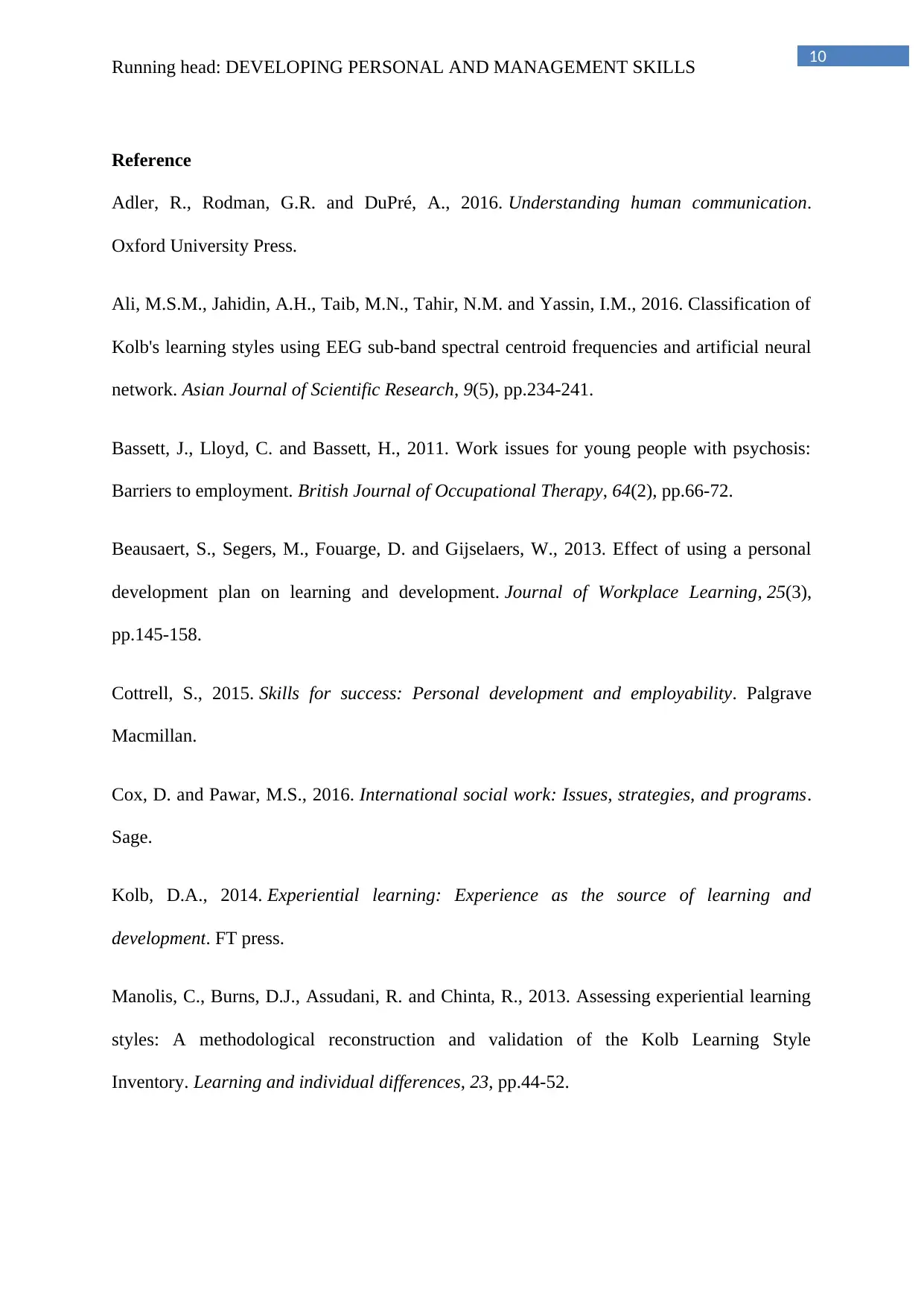
10
Running head: DEVELOPING PERSONAL AND MANAGEMENT SKILLS
Reference
Adler, R., Rodman, G.R. and DuPré, A., 2016. Understanding human communication.
Oxford University Press.
Ali, M.S.M., Jahidin, A.H., Taib, M.N., Tahir, N.M. and Yassin, I.M., 2016. Classification of
Kolb's learning styles using EEG sub-band spectral centroid frequencies and artificial neural
network. Asian Journal of Scientific Research, 9(5), pp.234-241.
Bassett, J., Lloyd, C. and Bassett, H., 2011. Work issues for young people with psychosis:
Barriers to employment. British Journal of Occupational Therapy, 64(2), pp.66-72.
Beausaert, S., Segers, M., Fouarge, D. and Gijselaers, W., 2013. Effect of using a personal
development plan on learning and development. Journal of Workplace Learning, 25(3),
pp.145-158.
Cottrell, S., 2015. Skills for success: Personal development and employability. Palgrave
Macmillan.
Cox, D. and Pawar, M.S., 2016. International social work: Issues, strategies, and programs.
Sage.
Kolb, D.A., 2014. Experiential learning: Experience as the source of learning and
development. FT press.
Manolis, C., Burns, D.J., Assudani, R. and Chinta, R., 2013. Assessing experiential learning
styles: A methodological reconstruction and validation of the Kolb Learning Style
Inventory. Learning and individual differences, 23, pp.44-52.
Running head: DEVELOPING PERSONAL AND MANAGEMENT SKILLS
Reference
Adler, R., Rodman, G.R. and DuPré, A., 2016. Understanding human communication.
Oxford University Press.
Ali, M.S.M., Jahidin, A.H., Taib, M.N., Tahir, N.M. and Yassin, I.M., 2016. Classification of
Kolb's learning styles using EEG sub-band spectral centroid frequencies and artificial neural
network. Asian Journal of Scientific Research, 9(5), pp.234-241.
Bassett, J., Lloyd, C. and Bassett, H., 2011. Work issues for young people with psychosis:
Barriers to employment. British Journal of Occupational Therapy, 64(2), pp.66-72.
Beausaert, S., Segers, M., Fouarge, D. and Gijselaers, W., 2013. Effect of using a personal
development plan on learning and development. Journal of Workplace Learning, 25(3),
pp.145-158.
Cottrell, S., 2015. Skills for success: Personal development and employability. Palgrave
Macmillan.
Cox, D. and Pawar, M.S., 2016. International social work: Issues, strategies, and programs.
Sage.
Kolb, D.A., 2014. Experiential learning: Experience as the source of learning and
development. FT press.
Manolis, C., Burns, D.J., Assudani, R. and Chinta, R., 2013. Assessing experiential learning
styles: A methodological reconstruction and validation of the Kolb Learning Style
Inventory. Learning and individual differences, 23, pp.44-52.
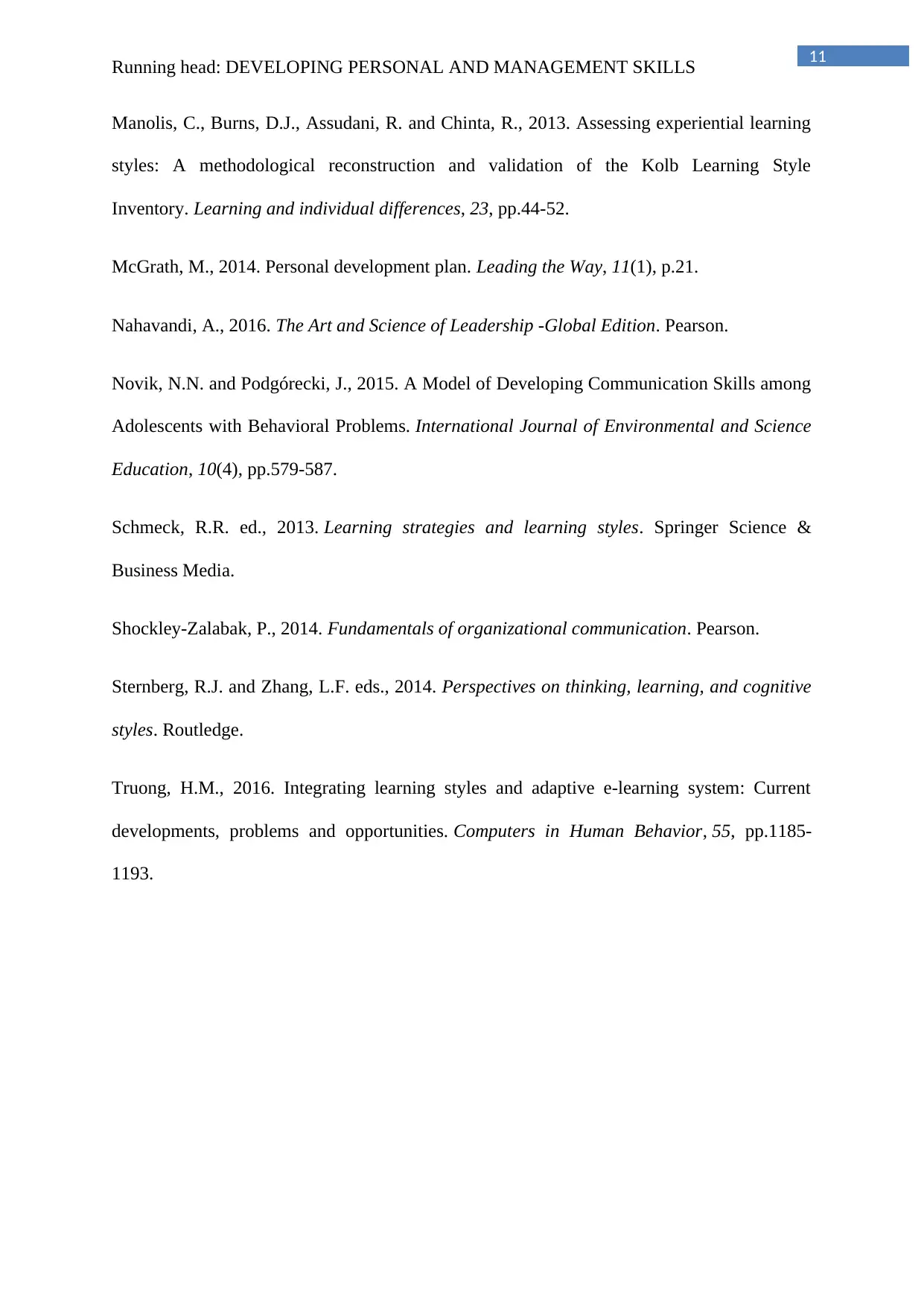
11
Running head: DEVELOPING PERSONAL AND MANAGEMENT SKILLS
Manolis, C., Burns, D.J., Assudani, R. and Chinta, R., 2013. Assessing experiential learning
styles: A methodological reconstruction and validation of the Kolb Learning Style
Inventory. Learning and individual differences, 23, pp.44-52.
McGrath, M., 2014. Personal development plan. Leading the Way, 11(1), p.21.
Nahavandi, A., 2016. The Art and Science of Leadership -Global Edition. Pearson.
Novik, N.N. and Podgórecki, J., 2015. A Model of Developing Communication Skills among
Adolescents with Behavioral Problems. International Journal of Environmental and Science
Education, 10(4), pp.579-587.
Schmeck, R.R. ed., 2013. Learning strategies and learning styles. Springer Science &
Business Media.
Shockley-Zalabak, P., 2014. Fundamentals of organizational communication. Pearson.
Sternberg, R.J. and Zhang, L.F. eds., 2014. Perspectives on thinking, learning, and cognitive
styles. Routledge.
Truong, H.M., 2016. Integrating learning styles and adaptive e-learning system: Current
developments, problems and opportunities. Computers in Human Behavior, 55, pp.1185-
1193.
Running head: DEVELOPING PERSONAL AND MANAGEMENT SKILLS
Manolis, C., Burns, D.J., Assudani, R. and Chinta, R., 2013. Assessing experiential learning
styles: A methodological reconstruction and validation of the Kolb Learning Style
Inventory. Learning and individual differences, 23, pp.44-52.
McGrath, M., 2014. Personal development plan. Leading the Way, 11(1), p.21.
Nahavandi, A., 2016. The Art and Science of Leadership -Global Edition. Pearson.
Novik, N.N. and Podgórecki, J., 2015. A Model of Developing Communication Skills among
Adolescents with Behavioral Problems. International Journal of Environmental and Science
Education, 10(4), pp.579-587.
Schmeck, R.R. ed., 2013. Learning strategies and learning styles. Springer Science &
Business Media.
Shockley-Zalabak, P., 2014. Fundamentals of organizational communication. Pearson.
Sternberg, R.J. and Zhang, L.F. eds., 2014. Perspectives on thinking, learning, and cognitive
styles. Routledge.
Truong, H.M., 2016. Integrating learning styles and adaptive e-learning system: Current
developments, problems and opportunities. Computers in Human Behavior, 55, pp.1185-
1193.
⊘ This is a preview!⊘
Do you want full access?
Subscribe today to unlock all pages.

Trusted by 1+ million students worldwide
1 out of 15
Related Documents
Your All-in-One AI-Powered Toolkit for Academic Success.
+13062052269
info@desklib.com
Available 24*7 on WhatsApp / Email
![[object Object]](/_next/static/media/star-bottom.7253800d.svg)
Unlock your academic potential
Copyright © 2020–2025 A2Z Services. All Rights Reserved. Developed and managed by ZUCOL.




